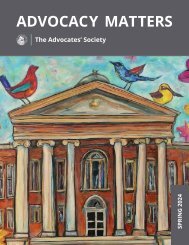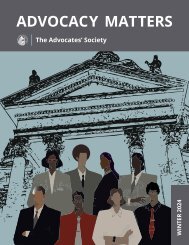Advocacy-Matters-Fall-2022
Keep up to date on what your fellow Society members have to say in Advocacy Matters.
Keep up to date on what your fellow Society members have to say in Advocacy Matters.
You also want an ePaper? Increase the reach of your titles
YUMPU automatically turns print PDFs into web optimized ePapers that Google loves.
0 Substitute gendered words for gender-neutral<br />
words. 5<br />
0 Use plural pronouns and adjectives, they or<br />
them, in place of the singular. This is completely<br />
acceptable informally and becoming<br />
more and more commonplace in formal writing.<br />
0 Use the pronoun “one” instead of using he,<br />
she, or they. Change “When he needs a washroom<br />
break” to “When one needs a washroom<br />
break.”<br />
0 Rephrase the sentence to use the relative<br />
pronoun “who” instead of using he, she, or<br />
they. Change “If a judge needs to use the washroom,<br />
she should take a recess” to “A judge<br />
who needs to use the washroom should take<br />
a recess.”<br />
0 Use plural antecedents. Change “A judge<br />
must announce that he is taking a recess before<br />
excusing himself from the Court” to “Judges<br />
must announce that they are taking recesses<br />
before excusing themselves from the Court.”<br />
0 Omit the gendered word. Change “A Judge<br />
may take a recess to address his personal business”<br />
to “A judge may take a recess to address<br />
personal business”.<br />
0 Use a neutral word or phrase. In these examples,<br />
“judge” or “judges” is neutral.<br />
0 Repeat the noun. Change “A judge must announce<br />
that he is taking a recess” to “The judge<br />
must announce that the judge is taking a recess”<br />
Sometimes, gender is important to the communication<br />
and to the individuals to whom the<br />
communication is addressed. Using the correct<br />
prefixes and pronouns is respectful. 6 As an example,<br />
in an update to incorporate more accessible<br />
and inclusive language in court proceedings in Ontario,<br />
in collaboration with the Court of Appeal for<br />
Ontario, the Ontario Superior Court of Justice, and<br />
the Ontario Court of Justice, Court Services Division<br />
(“CSD”) provided notice that:<br />
0 CSD staff may invite parties, representatives<br />
and others to share their prefix (also known as<br />
a title or salutation) and pronouns.<br />
0 Participants, including lawyers, litigants and witnesses,<br />
are encouraged to proactively provide<br />
their first name, last name, prefix (e.g., Mr./Ms./<br />
Mrs./Mx., etc.) and/or pronouns (e.g., he/him,<br />
she/her, they/them, etc.) when stating their<br />
name or by updating their screen name during<br />
a virtual proceeding. 7<br />
As a further example, TAS developed guidance<br />
to TAS leadership, committee members, and staff<br />
about the use of gender-inclusive language, including<br />
pronouns, within the day-to-day work of the<br />
Society. 8 In the Guide for TAS Leadership About<br />
the Use of Gender-Inclusive Language and Pronouns<br />
Within the Society, TAS recognizes that the<br />
use of gender-inclusive language, including a person’s<br />
correct name and pronouns, is fundamentally<br />
about respect, human dignity, and equality.<br />
When it comes to the use of pronouns, TAS generally adopts a “lead by example” or “encouragement”<br />
approach. Where someone offers their pronouns, we should respect and use them.<br />
Avoid<br />
Dear Sirs, Dear Mesdames or Dear Sirs and Mesdames<br />
(in a letter or email to colleagues) 9<br />
Use<br />
Dear Counsel or Dear Colleagues or Dear All<br />
Businessman Business executive / entrepreneur /<br />
business person<br />
Workman<br />
Waiter/waitress<br />
Policeman<br />
Finally, use gender-neutral terms<br />
Worker<br />
Server<br />
Police Officer<br />
16 17

















